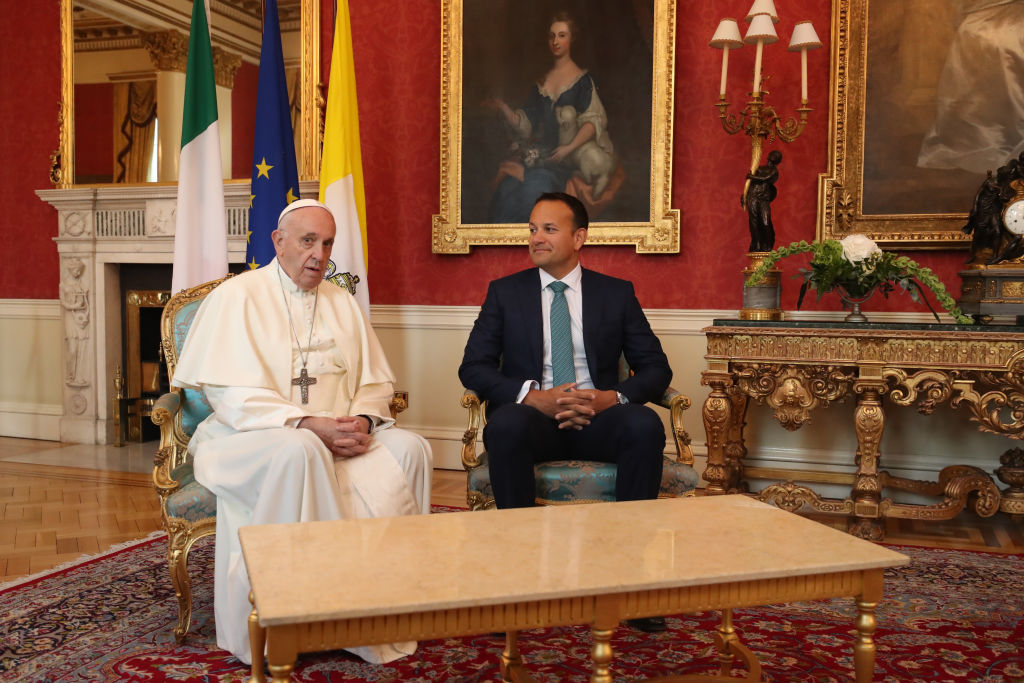No one on earth could fulfil the expectations that have been invested in the visit of Pope Francis to Ireland. He is meant to respond to the crisis of clerical child abuse and institutional self preservation within the global church during his first official address at Dublin Castle in a fashion that appeases the church’s critics in Ireland, who are, frankly, in no mood to be appeased. What he did do in his speech was express once again perfectly decent sentiments of abhorrence at the violation of children by members of the clergy. It won’t, and couldn’t, satisfy those who wanted him to use this occasion to make quite explicit commitments about mandatory reporting of abuse globally, as required by one of the most vocal of the victims of clerical abuse, Marie Collins, who resigned from the Vatican commission on abuse out of impatience with its slow rate of progress.
But then, his one meeting with officialdom probably wasn’t the place to make concrete policy statements. It was more about mood, about two players in a contemporary Kulturkampf – a cultural struggle between the church and contemporary Irish liberalism (represented by the pope and the Irish prime minister, Leo Varadkar) – setting out their stalls. As these things go, it was a civil and respectful encounter between the two. The Irish prime minister said, pretty well explicitly, that in a new settlement between church and state in contemporary Ireland, the Catholic church wouldn’t be centre stage. It wouldn’t call the shots in institutions like schools and hospitals – which have been pretty well run by the church since the foundation of the state; the church would be one player among many. For his part, the pope dealt obliquely with the outcome of the abortion referendum, by referring to a throwaway society in which unborn humanity is denied even the basic right to life.
The gathering was enlivened in advance by the number of people, mostly politicians, who declared they’d be taking the opportunity to lecture the pope about child abuse, misogyny, women’s ordination, the usual…from the looks of things, they’d have had their work cut out. The only person who got prolonged me-time with the pontiff was Leo Varadkar for a ten minute encounter in private, in which he promised to raise these issues. Leo V has a reputation for being star struck by visiting heads of state; not this one, it seems. See below for the crucial excerpt from his speech.
Frankly the pope does himself no favours by reading aloud, in Italian, from a prepared script – there wasn’t much eye contact in his first official address, except with the passage about abuse. His delivery was monotonous. For someone who spent his last visit to Ireland in 1980 learning English, it wasn’t much of an advertisement for that effort. Better a shorter speech in halting English than fluent Italian delivered over microphones…excellent sentiments were lost in translation. Where the pope does make an impact is in his gestures: his removal of his papal biretta when he left his plane, his embrace of children, his disarming and sincere smile when meeting people he really wants to engage with, which doesn’t include members of government.
He’s on safer ground with his other engagements, at the Matt Talbot centre in a working class part of Dublin which was entirely overlooked during the last papal visit, an off camera visit to a homeless centre run by Capuchin friars. But tonight, at a concert for the gathering he is actually here to address, the World Meeting of Families, he may come closer to hard talk on the subject of abuse and how to deal with it. His reception so far has been respectful, though it’s hard to make an impact in a Dublin that’s in near shutdown for security reasons. He may yet do what he does best, which is speak from the heart, directly to people. For a pope who is, remarkably, treated as separate from the Vatican, his best hope is to be seen as the scourge of the institution of which he is in fact, head.
From Leo V’s talk: The Ireland of the 21st century is a very different place today than it was in the past. Ireland is increasingly diverse.
One in six of us were not born here, and there are more and more people who adhere to other faiths, or who are comfortable in declaring that they subscribe to no organised religion.
We have voted in our parliament and by referendum to modernise our laws – understanding that marriages do not always work, that women should make their own decisions, and that families come in many forms including those headed by a grandparent, lone parent or same-sex parents or parents who are divorced.
Holy Father, I believe that the time has now come for us to build a new relationship between church and state in Ireland – a new covenant for the 21st Century. It is my hope that your visit marks the opening of a new chapter in the relationship between Ireland and the Catholic Church.
Building on our intertwined history, and learning from our shared mistakes, it can be one in which religion is no longer at the centre of our society, but in which it still has an important place.
One with greater diversity and choice when it comes to the patronage of our schools – and where publicly-funded hospitals are imbued with a civic and scientific ethos.







Comments